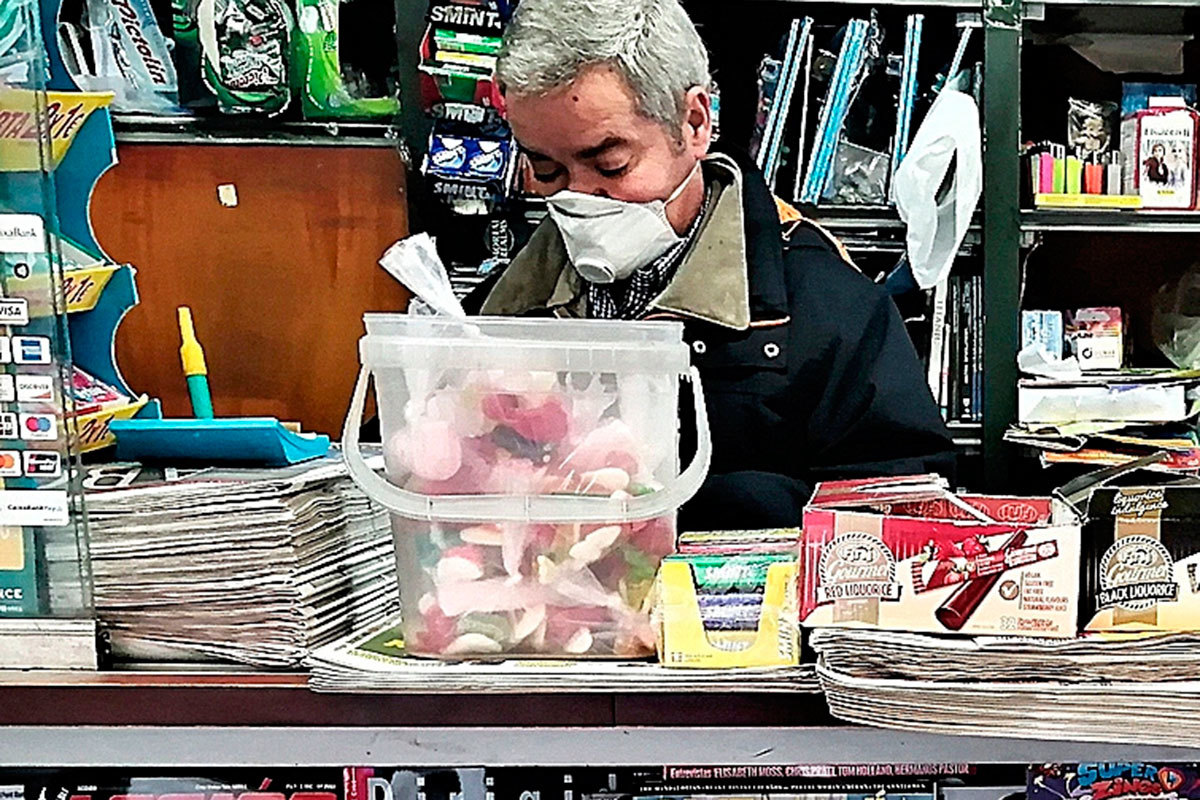- Direct: last minute of the coronavirus in Spain
- Madrid.The miracle of residence without infection
Sometimes a paper newspaper can be as necessary, or almost as necessary, as a loaf of bread or medicine . Especially for those who cannot go outside to buy it. Its contents are a stimulus, a therapy, an intellectual relief for older readers, that these days of emergency live more isolated than anyone because they are more at risk of dying if they catch the coronavirus, and that they prefer to maintain their habit of reading the news in its printed version.
The kiosk Rafael García Urbano , owner of the kiosk in the Plaza de San Lorenzo in Seville , in front of the Jesus del Gran Poder basilica, goes out twice every day to distribute daily newspapers from house to house to its oldest subscribers in the neighborhood. “Some have gone two weeks without going down to the kiosk, until they have found out that I am taking it to their house at no cost. Word has spread and new older readers are calling me to do commissions, "says Rafael García.
The also president of Híspalis, one of the two kiosk associations in Seville, invites EL MUNDO to accompany him on the route through the streets of the neighborhood to bring his newspapers to Salud, Juan, Meli, Rafael, Rosa, Soledad, Antonio .. Voracious and faithful readers, some handicapped, for whom the newspaper is, at their eighties, like the umbilical cord that keeps them connected to external reality.
He closes the press station after two in the afternoon and, before going home uniformed with nitrile gloves and a sanitary mask, he dedicates himself for the second time in the day to distribute from door to door his daily dose of data and stories to his most veteran clients, just as if he brought them pills from the pharmacy to stay awake and alive.
From the other side of the glazed door that leads to the hallway of her house, Mrs. Meli says that with the confinement she has had to do without the assistant who helped her and now she is alone and takes care of everything. Her daily newspaper, she says, helps her cope with isolation.
A copy of Soledad and Antonio are waiting for him in a nearby block: since he can't see well, his wife reads the news. Another older neighbor of the building, Rosa, has the door ajar that she was to be on the street all day and now she has to resign herself to not looking out onto the sidewalk. They won't let me out, my gun. Does reading the press benefit you? "To me, yes," he replies. His newspaper is his part of war. At his age, what most interests him are obituaries: finding out "who is dying", he admits with a kind smile.
On the way from house to house, Rafael García tells that he has been running the San Lorenzo kiosk by municipal concession since 1998, 22 years ago, after inheriting it from his aunt, Manuela Navarro Muñoz, who worked it for 40 years. he had made the social utility of his trade as evident as now. «We are the last link in the information. See if we are necessary, that now we have to open; it is a moral obligation to the clients ”, he reflects. «We have to take care of our elders, thanks to them we are here. So I bring you the newspaper, and, if you ask me, the bread and medicine from the pharmacy.
Press kiosks, considered essential by the Government, are one of the few shops that can open under alarm. But part of them have had to close because sales have fallen. He himself will start working at night as a security guard to compensate for the losses of his day job as a kiosk.
Of the 330 kiosks in the Andalusian capital , 120 are from the press and the rest only from trinkets, which cannot be opened, details Rafael Ruiz. He estimates that in the press positions in the peripheral neighborhoods sales have plummeted 70%. At its kiosk, global turnover, including sweets, has also fallen, but instead the sale of newspapers and magazines has experienced a slight upswing, due to the desire, the need for information in times of calamity. "A priest who used to buy a newspaper now takes three, and also a hobby magazine," says Ruiz.
In the same way that for the elderly who are served by the Rafael kiosk, reading newspapers is also a mental sap for Mr. Francisco , an unsuspected taxpayer of the suffering media industry: he lives as a homeless man in a portico in the plaza from Cuba and almost every day he goes to the kiosk on the corner, run by another Francisco, to buy himself a copy with the alms that passers-by give him. In a rainy midday of the quarantine, we see him invest 1.50 euros in a newspaper that he immediately devours in his corner of the arcade. It also has a radio and a mobile phone without internet. His glasses and white hair and beard give him a venerable teacher look. He says that the police stop him from living on the street for the moment because in the municipal shelter where they have ordered him to go to pass the confinement they do not admit him with his two puppies.
The press kiosk provides an essential service in the state of alarm. But Francisco, the owner of the stall in the deserted square of Cuba, declares, face mask, that if he continues to sell so little, he will have to close. In a while, the only customer who has come to buy from him has been his namesake, the homeless cult on the corner.
According to the criteria of The Trust Project
Know more- Seville
- Andalusia

